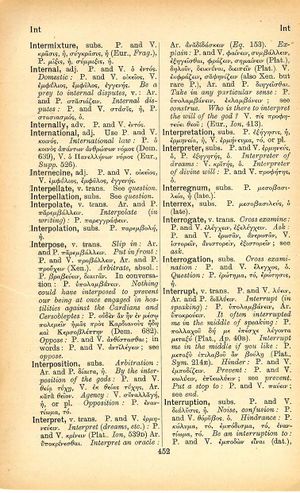interrex
Περὶ τοῦ ἐπέκεινα τοῦ νοῦ κατὰ μὲν νόησιν πολλὰ λέγεται, θεωρεῖται δὲ ἀνοησίᾳ κρείττονι νοήσεως → On the subject of that which is beyond intellect, many statements are made on the basis of intellection, but it may be immediately cognised only by means of a non-intellection superior to intellection
English > Greek (Woodhouse)
subs.
P. μεσοβασιλεύς, ὁ (late).
Latin > English (Lewis & Short)
inter-rex: rēgis, m.,
I one who held the regal office between the death of one king and the election of another; a regent, interrex, Liv. 1, 17; 1, 32.—
II During the times of the republic, one who held the supreme power from the death or absence of the chief magistrates till the election of new ones: L. Flaccus interrex legem de Sulla tulit, Cic. Agr. 3, 2, 5; id. Leg. 1, 15, 42; id. Dom. 14, 38: prodere, to nominate, appoint, id. Agr. 3, 2, 5: creare, Liv. 5, 31, 8: infestam patribus plebem interreges cum accepissent, id. 7, 21.

